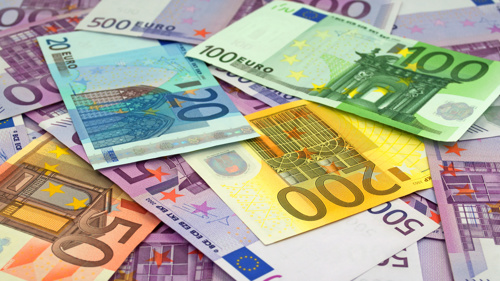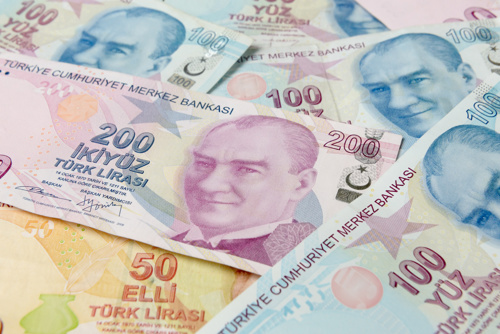The currency in Turkey – written as Türkiye in the local language – is the Turkish lira (₺), which is abbreviated to TRY and TL. It’s been the country’s official currency since 1844, and although you’ll find some shops and restaurants in Turkey will accept euros and US dollars, they’re likely to add on conversion fees that will hike the prices up.
To avoid getting caught out, we recommend buying Turkish lira before you go to secure a good exchange rate and avoid extra fees while you’re away. So, we’ve covered everything you need to know about the Turkish lira ahead of your trip, so you’re ready to visit the bazaars – or say yes to one more sunset cocktail…
What’s the best currency to take to Turkey?
The Turkish lira is the most widely accepted currency in Turkey, and this place is about as diverse as travel destinations get. Not only does the country straddle two continents – Europe and Asia – but its coastlines combine the Black Sea in the north, the Mediterranean Sea in the south and the Aegean Sea in the west.
That means you’ll notice a real mix of landscapes and influences depending on where you stay, from lively beach resorts like Fethiye and Marmaris, to cosmopolitan cities like Istanbul. The currency in Turkey remains the same wherever you’re heading to, though, so you can stock up on Turkish lira before you go.
Turkish lira denominations
You’ll find Turkish lira banknotes available in denominations of 5, 10, 20, 50, 100 and 200 liras. Each one features an image of Mustafa Kemal Atatürk, founder and first president of the Republic of Turkey.
One lira is made up of 100 kuruş, and coins are available as 1, 5, 10, 25, and 50 kuruş, and 1 lira. When you’re buying your foreign currency, bear in mind that not all denominations are available to exchange.
The history of Turkey’s currency
The Turkish lira was first launched in 1844 as the Ottoman lira, becoming the Turkish lira in 1923 when Turkey became a republic. It was redenominated in 2005 – taking off six zeros from the currency – which made buying and selling with it much easier.
Turkish lira around the world
There are only two places in the world where the Turkish lira is used: Turkey and the Turkish Republic of Northern Cyprus.
The current exchange rate for the Turkish lira
The cost of 1 Turkish lira in British Pound Sterling varies according to the exchange rate. For today’s rate, take a look at our Turkish lira currency conversion calculator.
Can you use euros in Turkey?

Yes, you can use euros at some places in Turkey, and you might notice that prices are sometimes displayed in euros and US dollars as well as Turkish lira, which can be confusing for visitors. Some sellers may accept pounds, too, particularly in areas popular with tourists.
Bear in mind that although this may seem convenient if you’ve got other currencies in your wallet, it’s very likely that prices in euros, US dollars and pounds include a markup. This is factored in to cover the cost of conversion, meaning you end up paying more.
To get the most from your holiday budget we therefore recommend paying in Turkish lira while you’re in Turkey.
What payment methods are accepted in Turkey?

Turkey is all set up to accept cash, card and digital wallet payments. The payment method you choose will depend on the purchase and whether you’re in a central or rural area.
Cash
Cash is king in Turkey when it comes to paying for things at markets and smaller shops – particularly in more rural areas – as well as for tipping. So it’s worth getting to know what each Turkish lira note equates to in pounds, so you have a rough idea of costs. While 100 Turkish lira sounds like a lot, for example, bear in mind that it generally equates to a few pounds – or less – depending on the exchange rate.
Debit and credit cards
Card payments are rising in popularity in Turkey and, according to Statista, accounted for more than half of the total point of sale (POS) payments in Turkey in 2023. Just bear in mind that your card issuer might add on a fee every time you pay for something in a foreign currency, so costs can soon add up. And be sure to check if your credit card is accepted in Turkey before you travel. While Visa and Mastercard are widely accepted abroad, for example, American Express can be less widely accepted.
Digital wallets (Google/Apple Pay)
While mobile payments are becoming more popular in Turkey, not everywhere is set up to take payment via apps like Google Wallet and Apple Pay. Particularly in more remote areas, it’s best not to rely on these as your primary payment method and carry cash and card instead. Also bear in mind that your standard card charges will apply when paying via digital wallet, as well as potentially additional data and overseas charges made by your mobile provider.
How much money should I take with me?
As a general rule of thumb, you’ll find your money goes a lot further in Turkey than it does in the UK. To give you an idea, the cost of living in Turkey is around 40% lower than the UK at the time of writing, and we’ve given some example costs you can expect to see below. Bear in mind that these figures change regularly, so it’s worth doing some independent research before your trip.
- A meal out for two: 1,500.00 TL
- A cappuccino: 128.57 TLY
- A beer: 180.00 TL
- A bottle of water: 18.86 TL
- A single ticket on local transport: 27.00 TL
Buying Turkish lira with M&S Travel Money
Ready for your Turkish adventure? Order your Turkish lira online today for Click & Collect with no commission and no hidden fees. T&Cs apply.

